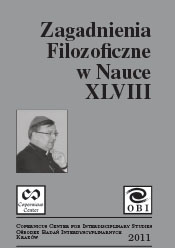Miedzy oczywistością a dedukcją. Platon i Euklides o równości
Between obviousness and deduction. Plato and Euclid on equality
Author(s): Piotr Błaszczyk, Kazimierz MrówkaSubject(s): Epistemology, Philosophy of Science
Published by: Copernicus Center Press
Keywords: equality; Euclid; Plato;
Summary/Abstract: We confront Plato's understanding of equality in geometry with that of Euclid. We comment on Phaedo, 74b-c, Meno, 81e-85d and Elements, Book I. We distinguish between two meanings of equality, congruence and equality of the area, and show that in Plato equality means congruence. In Euclid, starting with the first definitions until Proposition I.34, equality means congruence. In the proof of Proposition I.35 equality gains a new meaning and two figures that are not congruent, and in this sense unequal, are considered to be equal. While Plato's geometry is based on self-evident facts, Euclid's geometry rests on deduction and the axioms that are by no means self-evident. However, the shift of meaning from congruence to equality of the area can be substantiated by reference to Euclid's axioms of equality. Finally, we present an ontological interpretation of the two attitudes to equality that we find in Plato's and Euclid's writings.
Journal: Zagadnienia Filozoficzne w Nauce
- Issue Year: 2011
- Issue No: 48
- Page Range: 127-147
- Page Count: 21
- Language: Polish

